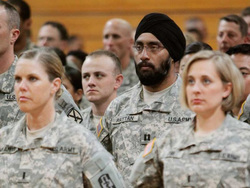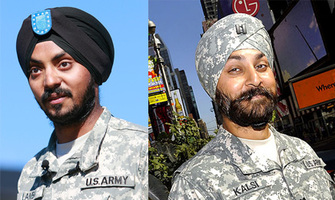 Capt. Tejdeep Singh Rattan
Capt. Tejdeep Singh Rattan NEW YORK, NY - The US should change its policy to allow more Indian-Americans to join the military without compromising on their religious beliefs and practices, the only three Sikh soldiers in the US Army say.
Major Kamaljeet Singh Kalsi, Captain Tejdeep Singh Rattan and Corporal Simran Preet Singh Lamba are the only three Sikhs serving in the US Army currently.
Having shattered stereotypes, the three have won awards and commendations for their service, including postings in Afghanistan. They now want to see a change in federal policy that allows not just Sikhs but other Indian-Americans to join the military and serve without having to compromise on their religious beliefs and practices. “It is just a matter of time. This is an issue of diversity, if people of all colors and races can join the military so can Indians, so can Sardars, Sikhs, Hindus and Muslims,” Kalsi, an emergency medicine doctor, said.
Major Kamaljeet Singh Kalsi, Captain Tejdeep Singh Rattan and Corporal Simran Preet Singh Lamba are the only three Sikhs serving in the US Army currently.
Having shattered stereotypes, the three have won awards and commendations for their service, including postings in Afghanistan. They now want to see a change in federal policy that allows not just Sikhs but other Indian-Americans to join the military and serve without having to compromise on their religious beliefs and practices. “It is just a matter of time. This is an issue of diversity, if people of all colors and races can join the military so can Indians, so can Sardars, Sikhs, Hindus and Muslims,” Kalsi, an emergency medicine doctor, said.
 (L) Corporal Simran Preet Singh Lamba (R) Major Kamaljeet Singh Kalsi
(L) Corporal Simran Preet Singh Lamba (R) Major Kamaljeet Singh Kalsi The first turbaned US Sikh soldier in over 30 years, Kalsi received the Bronze Star Medal, the fourth-highest combat award for his meritorious services in Afghanistan in 2011.
He said diversity in the forces is key to make America stronger and more beautiful country.
“We are all in this together. Diversity is a strategic imperative. If we want to make this a more stronger and beautiful country we have to commit to diversity and we need a military that looks like the people it protects,” he said.
Lamba, who was recruited in 2010 for his special language skills in Hindi and Punjabi through the Military Accessions Vital to the National Interest (MAVNI) program, said there is need for change in federal policy that will open the doors for not just Sikhs but Indian-Americans to serve in the military. “Sikhs are part of the country, they are Americans as everybody else here. We need support of everyone from the community and other Indians to change the overall policy,” he said adding that once the Army opens its door, other branches of the military could also follow suit and recruit more immigrants from diverse backgrounds.
Kalsi said he is privileged to be able to serve in the US Army and looks forward to a future when his children and those of other immigrants and nationalities would be able serve “freely and proudly” for the country.
“This is my favourite turban, my camouflage turban, I take great pride in it. We don’t take that lightly,” Kalsi said as he touches his turban with a visible sense of pride.
“When Sikhs can serve proudly in nations like India, UK and Canada, there is no reason why we cannot serve here. I look forward to a future when not only my children but everyone’s children can serve freely and proudly for the country.”
Rattan said Indian parents in the US prefer that their children take up lucrative, flourishing and comfortable professions and are not inclined to send to join the forces.
Rattan, who began serving as an Army dentist at Fort Drum in May 2010, says he has shared his experiences of serving in the Army with other Indian families so that they encourage their children to look at the military as a career option.
Rattan was appointed Detachment Commander of US Army Dental Activity at Fort Drum in July 2010. He has also served in Afghanistan and received an Army Commendation Medal and a NATO Medal for his service.
“If you keep on pushing the little brick in the wall, it will drop. With perseverance, mental mindset, things will change,” he said.
“I would like my son to be able to get what he wants,” Rattan, who was accepted into the military after applying four times, said.
The three however add that it pains them to see people from their community and other minorities being made targets of hate crimes and stressed the need for spreading awareness among people about the cultures and histories of immigrants.
“It makes my blood boil to see a hate crime against anyone, not just a Sikh. It is inexcusable in this day and age. These hate crimes are going to continue to happen not just against Sikhs but against all minorities until we can fully embrace our differences,” Kalsi said. “This is a question about what an American looks like. An American looks like a guy who has a beard and wears an Army turban, we are up against that notion of what is an American,” he said.
Kalsi added that support from the President, Congress and military is required to “push back against the hate in a constructive way”. “Allowing Sikhs into the military, by supporting women into the military, by supporting people and minorities of all color and religions in the military will make a stronger military and will make us a stronger community.”
Lamba said he feels “very bad” when he hears of incidents like the Wisconsin gurudwara shooting in which six Sikh person were gunned down by a white supremacist.
“One on hand we are serving the country and on the other there are people who because of lack of awareness target Sikhs. This is ignorance,” he said adding that there are other people who also thank them for serving the country. “There are people who do not see my beard or turban but my service to the country.” “It will take time but we are getting there slowly,” he added. (PTI)
He said diversity in the forces is key to make America stronger and more beautiful country.
“We are all in this together. Diversity is a strategic imperative. If we want to make this a more stronger and beautiful country we have to commit to diversity and we need a military that looks like the people it protects,” he said.
Lamba, who was recruited in 2010 for his special language skills in Hindi and Punjabi through the Military Accessions Vital to the National Interest (MAVNI) program, said there is need for change in federal policy that will open the doors for not just Sikhs but Indian-Americans to serve in the military. “Sikhs are part of the country, they are Americans as everybody else here. We need support of everyone from the community and other Indians to change the overall policy,” he said adding that once the Army opens its door, other branches of the military could also follow suit and recruit more immigrants from diverse backgrounds.
Kalsi said he is privileged to be able to serve in the US Army and looks forward to a future when his children and those of other immigrants and nationalities would be able serve “freely and proudly” for the country.
“This is my favourite turban, my camouflage turban, I take great pride in it. We don’t take that lightly,” Kalsi said as he touches his turban with a visible sense of pride.
“When Sikhs can serve proudly in nations like India, UK and Canada, there is no reason why we cannot serve here. I look forward to a future when not only my children but everyone’s children can serve freely and proudly for the country.”
Rattan said Indian parents in the US prefer that their children take up lucrative, flourishing and comfortable professions and are not inclined to send to join the forces.
Rattan, who began serving as an Army dentist at Fort Drum in May 2010, says he has shared his experiences of serving in the Army with other Indian families so that they encourage their children to look at the military as a career option.
Rattan was appointed Detachment Commander of US Army Dental Activity at Fort Drum in July 2010. He has also served in Afghanistan and received an Army Commendation Medal and a NATO Medal for his service.
“If you keep on pushing the little brick in the wall, it will drop. With perseverance, mental mindset, things will change,” he said.
“I would like my son to be able to get what he wants,” Rattan, who was accepted into the military after applying four times, said.
The three however add that it pains them to see people from their community and other minorities being made targets of hate crimes and stressed the need for spreading awareness among people about the cultures and histories of immigrants.
“It makes my blood boil to see a hate crime against anyone, not just a Sikh. It is inexcusable in this day and age. These hate crimes are going to continue to happen not just against Sikhs but against all minorities until we can fully embrace our differences,” Kalsi said. “This is a question about what an American looks like. An American looks like a guy who has a beard and wears an Army turban, we are up against that notion of what is an American,” he said.
Kalsi added that support from the President, Congress and military is required to “push back against the hate in a constructive way”. “Allowing Sikhs into the military, by supporting women into the military, by supporting people and minorities of all color and religions in the military will make a stronger military and will make us a stronger community.”
Lamba said he feels “very bad” when he hears of incidents like the Wisconsin gurudwara shooting in which six Sikh person were gunned down by a white supremacist.
“One on hand we are serving the country and on the other there are people who because of lack of awareness target Sikhs. This is ignorance,” he said adding that there are other people who also thank them for serving the country. “There are people who do not see my beard or turban but my service to the country.” “It will take time but we are getting there slowly,” he added. (PTI)

 RSS Feed
RSS Feed
